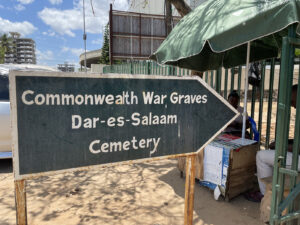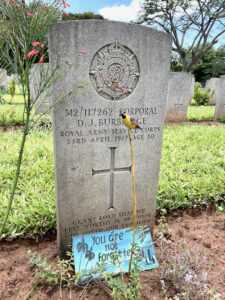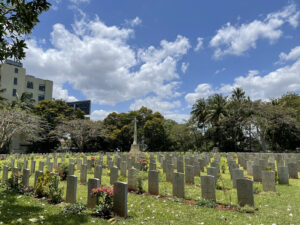It was my first visit to the big war cemetery, having walked past and gone into, the smaller cemetery in town. As it turned out, my great uncle happened to be buried there, a fact which had only come to light last week at a family gathering in Oxfordshire.
I knew that Aunty Ella’s husband (and therefore Joy’s father) had died in Africa in World War I but I had no idea he had died in the country in which I have been living for 3 years. There was therefore a request from the family that I was happy to fulfil, to visit the grave.
At the last minute I realised that one should probably mark the visit in some way – leave some flowers or something. In the end, I decided to go for a tourist sign with an African scene and some space for something like, “Toby’s room” or Jessica’s room”.
Given that I hadn’t really done this before and that it was a war grave I asked the artisan to write “You are not forgotten” on it and then I bought a small wooden bird on a long stick. I rang my young Chinese friend Eric, who was on half-term break and bored, and he met me in Masaki.
It took a while for the three of us – me, Eric and the bajaj driver – to find the entrance to the cemetery. Eventually we had to ask the street traders to point us in the right direction. War cemeteries certainly make you stop – take a moment to consider the utter waste of life in all wars.
World War I was particularly nasty and many soldiers like my relative – David John Burbridge – died of disease rather than a bullet. In February 1916, he was posted to East Africa where he spent time in Kenya and then fatally came to Tanzania. He died of dysentery in Dodoma and brought to Dar es Salaam and laid in the Commonwealth War Cemetery alongside his brothers in arms.
When you walk around the cemetery you cannot help but be struck by the number of dead from all corners of the British Empire. There were many Indians as well as some Jews and in a quiet corner set back from the rest, an area for the burial of German soldiers, some named and others unknown.
It is these graves of unknown soldiers on both sides, which are the most poignant – somewhere somewhere must have wondered where their loved one is buried. It could be here in Dar es Salaam in a peaceful area with overhanging flowering trees and dedicated workers.
In fact it was one of the workers who found the grave. Eric and I had walked quickly back and forth scanning the graves but she knew where it was and led us straight there.
I laid the notice at the bottom of the headstone and planted the wooden bird – a symbol of freedom. They gave their lives so that we could live free. They will never be forgotten.


